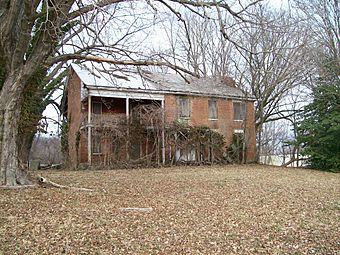Walter Curtis House facts for kids
Quick facts for kids |
|
|
Walter Curtis House
|
|

Front of the house
|
|
| Nearest city | Little Hocking, Ohio |
|---|---|
| Area | less than 1 acre (0.40 ha) |
| Built | 1827 |
| Architectural style | Greek Revival |
| NRHP reference No. | 80003244 |
| Added to NRHP | October 3, 1980 |
The Walter Curtis House is an old and important home in southern Washington County, Ohio, United States. It is located south of Little Hocking, a small town. This house was built in 1827 and has two stories. It is made of brick with some stone parts.
This house was once the home of Walter Curtis, a local leader. In the 1800s, Walter Curtis held several important jobs. He was a Washington County Commissioner, which means he helped manage the county. He was also an associate judge, helping with legal matters. Later, he became an Ohio state representative, making laws for the state. His son, Austin, also became a state representative later on.
Contents
Walter Curtis: Early Life and Family Home
Walter Curtis was born in 1787. In 1791, when he was just four years old, his family moved to Ohio from Warren, Connecticut. They first lived in Marietta. After a conflict called the Northwest Indian War ended, his family decided to start a farm. In 1795, they set up their farm southwest of Marietta.
Walter's father, Ebenezer, bought the land from people who bought and sold land. On this land, Ebenezer built a large, two-story log house. At the time, it was considered one of the best houses in the area.
Building the Greek Revival House
After his father passed away, Walter Curtis took over the entire farm. He bought the parts of the land that his family members had inherited. He also bought more land next to it from other owners. On this expanded farm, Walter built the house we see today. It is a Greek Revival style house. This style was popular in the early 1800s and looks like ancient Greek temples. The house is made of bricks laid in a pattern called common bond, and it has a pointed roof called a gable roof.
Walter Curtis's Role in the Community
As years went by, Walter Curtis became a very important person in his community. He was known for his work as a lawmaker. He was also a key person in the trade and business along the nearby Ohio River. Walter and his brother, Horace, ran a business together. They used special boats called keelboats to move goods. They transported items between river towns like Pittsburgh, Pennsylvania, Charleston, West Virginia, and Cincinnati, Ohio.
The House's Later Years and Importance
Walter Curtis lived a long life and passed away in 1876. After his death, his farm and house stayed in his family. His descendants continued to own the property until the 1920s.
Preserving a Historic Home
Walter's family did not change the house much over the years. Because of this, in the late 1900s, experts who study old buildings recognized it as a great example of an early Greek Revival farmhouse in southeastern Ohio.
In 1980, the Walter Curtis House was officially added to the National Register of Historic Places. This is a list of important places in the United States that are worth protecting. The house earned this honor for two main reasons: its special architecture and because it was the home of a very important local leader.
Other Important Places Nearby
The Walter Curtis House is one of six places in Belpre Township that have been added to this important list. Three other houses and a bridge in the city of Belpre are also on the list. Also, the home of Walter's brother, Horace, known as the Sawyer–Curtis House, in Little Hocking, is also a recognized historic site.



